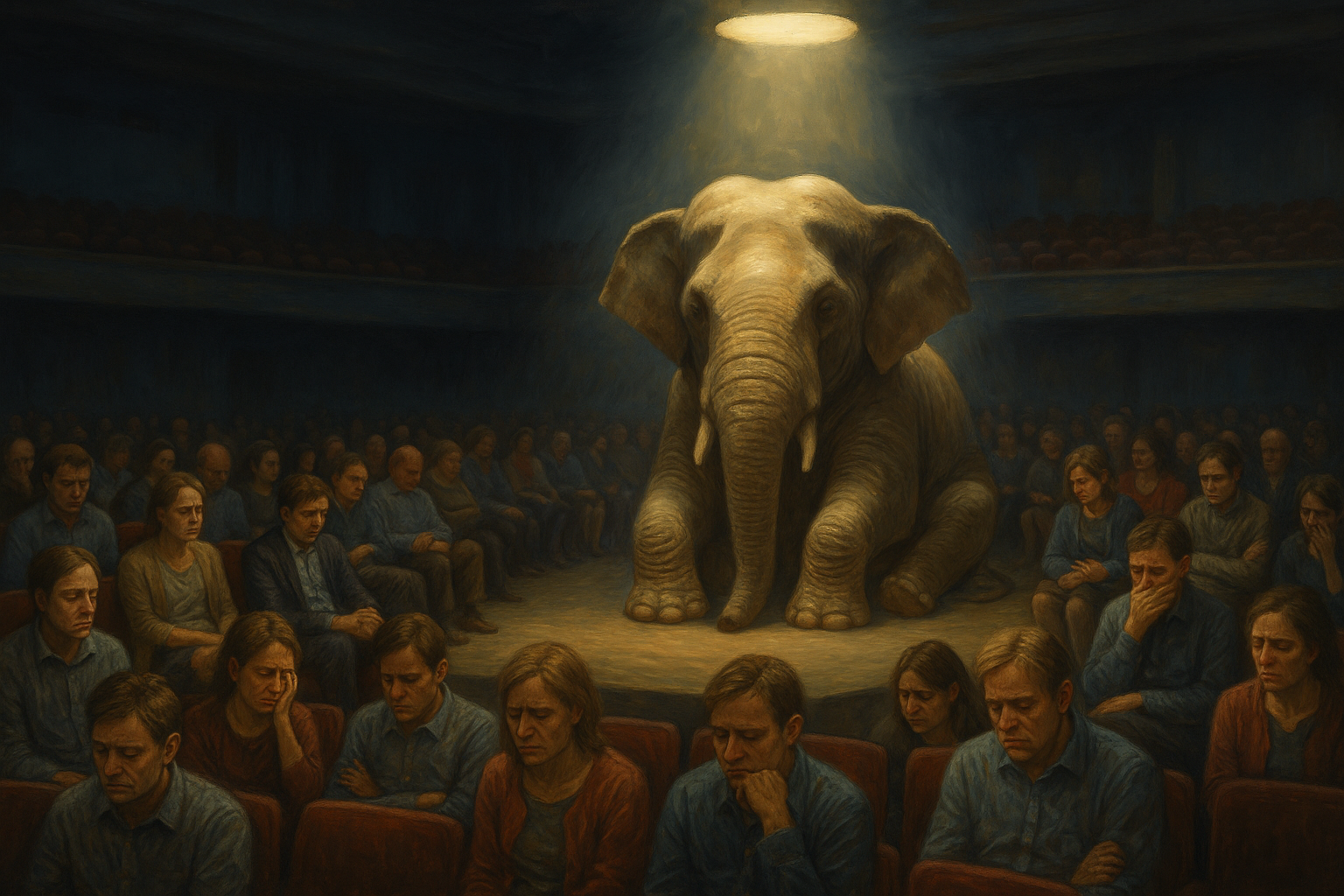The Elephant in the Room
It’s not just unemployment — it’s abandonment.

I have danced around this issue long enough, and I don't think I can keep silent about it any longer.
I’ve been seriously, persistently, actively job searching for six months. That doesn't mean I poke around job listings, click Easy Apply on a few of them, and then knock off early. I mean I'm treating this like an (unpaid) full-time job. And so while I do look at job listings — and I do apply to the Easy Apply ones — I have also:
- Studied the process. I follow recruiters, hiring managers, and other "thought leaders" on LinkedIn. I've read books about the subject. I regularly read articles on recruiting and job searching in 2025.
- Built a public-facing platform — you're looking at it. I wanted a place to broadcast an outbound signal, hoping to demonstrate engagement, mastery of domain, and depth of thought.
- Continued to learn and upskill. In many ways, I have learned more in the last six months than I think I have in the last six years.
I’ve also pivoted multiple times, iterated on my personal process, and refined my strategy and targets. I've asked for feedback from recruiters, mentors, peers — anyone who’d offer it.
And still? Nothing.
No offers. No interviews.
No engagement. No traction.
No feedback. No signal.
The Silence is Deafening
In any healthy system — biological, mechanical, organizational — feedback is what keeps it stable.
It’s how thermostats regulate temperature.
It’s how pilots course-correct.
It’s how ecosystems adapt and survive.
Feedback is the loop that lets a system sense deviation from the goal and take action to bring itself back into balance. Without it, systems drift. They degrade. Or they collapse entirely.
The job market is a system. And right now, it’s a system starved of feedback.
When you’re job searching, feedback is supposed to serve as a calibration tool. It tells you if your resume is hitting the mark, if your targeting is aligned with employer needs, if your interview approach is landing — or if there’s a mismatch between what you’re offering and what’s being asked.
Without that loop, you can’t adjust.
You can’t tell if the problem is scope, timing, narrative, skillset, market saturation — or something else entirely. All you know is that you’re not getting traction. But why? That’s the core dysfunction: the system withholds signal, and then punishes you for not interpreting it.
We're not just flying blind. We're flying blindfolded with earplugs, in a plane with no windows, no radio, no compass, no GPS, no altimeter — and we're running out of fuel. And we're expected to reach a destination we didn’t even know when we took off.
So you flail. You guess. You try tweaking titles, tweaking resumes, shifting industries, learning new skills, chasing trends — anything to provoke a response. You might get lucky, or you might start to spiral.
And sure — silence is a form of feedback. But it’s the worst kind:
- Ambiguous
- Non-specific
- Emotionally draining
It tells you something’s wrong, but gives you no way to diagnose or respond. It’s like being told you failed a test, but not which questions you got wrong — or even what the test was about. If the goal is to help people improve, grow, and find the right fit, then silence is not just unhelpful — it’s destructive.
Because systems without feedback don’t evolve.
They just break.
The Scary Thought
Here's what really scares me.
I feel like I know how to play this game. I've done my homework. I've thought this through. I'm better-equipped than the average person — and yet, I'm still stuck.
So, what's it like for everyone else?
What’s it like for people who don’t have a background in systems thinking or project management? Who can’t zoom out and see the bigger picture?
What’s it like for people who don’t have the time or energy to build out their personal platform? Who don’t have the technical skill to build support systems — or even find the right tools?
What’s it like for people who don’t have a network of friends and mentors? Who can’t compensate for the fact that the system itself isn’t giving them the feedback they need?
What happens to them?
I'll be blunt here: if the system is this opaque, this inconsistent, and this unresponsive even for people actively engaging with it at every level — then it’s not a user problem.
It’s a system problem.
The Real Cost
I haven’t even talked about the human cost of unemployment yet.
The economic cost is obvious. Your mortgage doesn’t stop just because you don’t have a job. Your bills still arrive. Your family still needs to be fed, clothed, housed — even while you're struggling to find work.
So you scale back. You economize. You trim your budget, tighten your belt, and do everything you can to cut costs. And maybe — maybe — you find a way to swing it.
But there’s an identity cost, too — a social cost. Our society has deeply intertwined who we are with what we do, to the point where it’s almost impossible to separate them.
Just think about the last time you met someone new. Once you cover their name and how you know them, one of the first questions is, “So, what do you do?” As if that’s the most telling thing we can ask. Not “What are your hopes and dreams?” Not “What brings you joy?” Just: “What’s your job?”
And when you don’t have an answer?
“I’m unemployed.”
Maybe you put a hopeful spin on it. Maybe you talk about what you did in your last role — just to avoid the truth that you're missing a piece of what society calls identity. You feel ashamed — feel less than.
Anything to avoid acknowledging the elephant in the room.
And this conversation repeats itself in a fractal array of permutations, every time you meet someone new. Over time, it wears you down. You feel yourself falling further and further behind — even when you’re working harder than ever.
Because it’s not just a job. It never was.
The Elephant, Acknowledged
We live in a world that tells you:
- “Work hard and good things will come! #TheAmericanDream”
- “Just apply yourself! #WorkSmarterNotHarder”
- “Don’t give up. #StayStrong #FeelSeen”
But when the feedback loop is broken — when the process is silent, when the system gives no signal at all — the burden shifts entirely onto the individual. And that’s simply unsustainable.
Here’s the thing — I don’t think I’m asking for anything unreasonable.
I'm not demanding a ridiculous title.
I’m not asking for wild money.
I’m not chasing a unicorn job where I fake productivity for a paycheck.
All I’m really looking for is a good fit:
- A job that matches my skills, experience, and the value I know I can bring
- A job that pays a reasonable salary, so I can support my family
- And (if I’m lucky) a job that offers some personal fulfillment
Shouldn’t that be the bare minimum we can all expect?
The elephant in the room isn’t unemployment.
It’s not “AI is ruining the hiring landscape.”
It’s not “politics is unsettling the economy.”
The elephant is that the hiring ecosystem is fundamentally broken.
And the result of that brokenness is a growing percentage of our population feeling lost — and abandoned.
And frankly, it's well past time we started talking about that elephant. It's the only way he'll leave.
